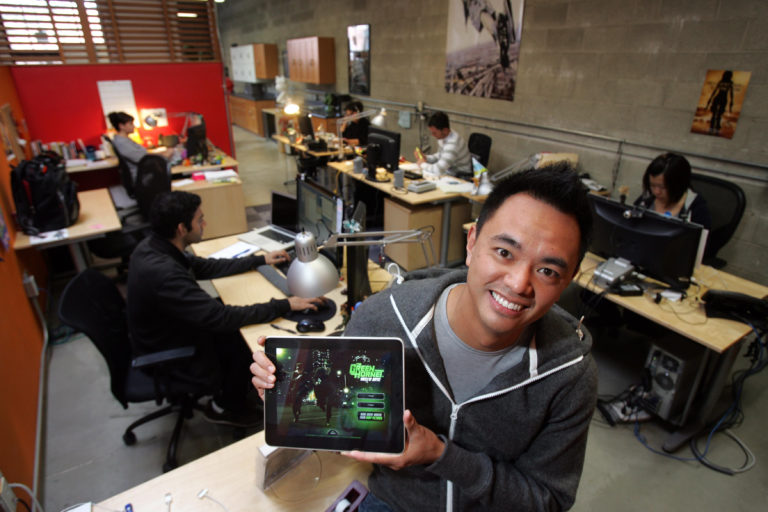
A West L.A. game studio and Sony Pictures are rewiring the connection between movies and games with a product based on the upcoming “Green Hornet” film.
Since its founding in 2005, game studio Trigger has made online and mobile games to promote action movies including “Transformers,” “Resident Evil” and “2012.” Film studios paid Trigger to create the games, which were free to players, in order to boost ticket sales.
But earlier this month the company and Sony tried the so-called “freemium” pricing model for release of the “Green Hornet Wheels of Justice” game for the iPhone. The model works like this: The game has 15 levels, but only the first five are free. To go into the next 10 levels, players must pay 99 cents through Apple’s online App Store.
There is far more of a financial risk for Trigger. Sony is paying the company an undisclosed amount to help develop the game, but the two will share revenue from sales of it.
If this pricing experiment works, Trigger plans to produce six to 12 freemium games every year through its newly formed sister company, Trigger Apps. To fund that production schedule, the company hopes to bring in venture capital.
“All the other apps we have built were work-for-hire from the studios and free to the consumer,” said Jason Yim, Trigger’s founder and chief executive. “It’s a big step to put our skin in the game. On Sony’s part, their marketing team saw the opportunity to license the mobile game to promote their movie and see if there’s opportunity on the retail side.”
Trigger normally takes three months to create a standard promotional game for client studios, which include Walt Disney Co., NBC Universal, Paramount and Sony. But for “Wheels of Justice,” the company spent almost six months, and it paid the extra costs of labor and overhead.
Dwight Caines, president of worldwide digital marketing at Sony Pictures, said the partnership arrangement with Trigger allows the studio to reach consumers through a new medium, namely iPhones and iPads. He believes the game represents an entertainment bargain.
“For about the same cost as a song on iTunes, consumers can more than triple their game-play experience,” he said.
Yim declined to state a specific financial goal for “Wheels,” but as a rule the movie games Trigger produces tally about 500,000 downloads. For “Wheels” to make financial sense, the number of people who convert from free to paying customers by spending the 99 cents must reach “well into the six figures,” he said. That would mean at least one out of every five players would have to convert to paying customers – and 20 percent is a very high level in the freemium sector.
Simon Buckingham, founder of the app store website Appitalism in New York, said that level of sales may be unrealistic unless “Green Hornet” the movie is a blockbuster.
“You’re relying on a small, usually single-digit percentage of people to become paying customers,” he said. “The vast majority will play the free game levels and stop, unless the movie is a hit. This could be a good deal for Trigger if ‘Green Hornet’ is a smashing success, but that’s a risky proposition.”
Buckingham said a typical game app costs about $75,000 to develop, but “Wheels” certainly cost more because of its 15 levels. He said the breakeven point all depends on how much of the cost Sony paid.
The movie tie-in provides a storyline and image for the game. More importantly, the game will ride the coattails of Hollywood’s massive marketing push. For example, the trailer for “Green Hornet” includes a plug for the mobile phone game. Yim plans more tie-ins when the movie debuts Jan. 14 and when the home video is released later next year.
“There are a lot of marketing dollars we can attract to get an app,” Yim said. “That’s important because there are so many apps being launched each day.”
Boom market
Wireless phone games are projected to grow 12 percent per year to become a $13 billion global market by 2014, according to a recent report from PriceWaterhouseCoopers, “The Global Entertainment & Media Outlook.” The spread of smart phones with better graphics and 3G networks with faster speeds “will provide an environment enabling wireless games to approach the quality of console games,” the report predicted.
But there are tens of thousands of game apps already on the market. Competitors in the mobile-game space range from multimillion-dollar Japanese corporations to weekend programmers.
Mobile games require less work than console games, which call for multimillion-dollar investments and years of development. But as Trigger, which has 20 employees in Los Angeles and about 50 in China, adopts the freemium model, it will need investment. Trigger’s studio work supported the “Wheels” experiment. Yim knows he will need to find backers to really ramp up production.
“It’s a question of cash flow,” he said. “How many times can we afford to roll the dice?”
He is waiting for some data on the “Wheels” experiment to help him attract venture capital next year. Meanwhile, he hopes gamers recommend “Wheels” to friends and that it will become a viral success.
In the game, players drive the streets of Los Angeles to catch escaping criminals, evade police chases and blow up gang members. The Hornet, along with faithful sidekick Kato, ride in the Black Beauty, a supercar armed with machine guns, flame throwers and missiles.
“For me, the biggest challenge is how to make a great game,” Yim said. “We have to balance marketing the movie and telling its story, and on the other hand, making a game that’s fun and people are willing to buy.”
